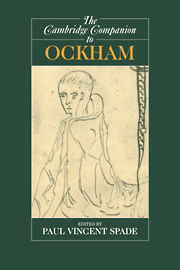Book contents
- Frontmatter
- Introduction
- 1 The Academic and Intellectual Worlds of Ockham
- 2 Some Aspects of Ockham's Logic
- 3 Semantics and Mental Language
- 4 Is There Synonymy in Ockham's Mental Language?
- 5 Ockhams' Nominalist Metaphysics
- 6 Ockham's Semantics and Ontology of the Categories
- 7 Ockham's Philosophy of Nature
- 8 The Mechanisms of Cognition
- 9 Ockham's Misunderstood Theory of Intuitive and Abstractive Cognition
- 10 Ockham's Ethical Theory
- 11 Ockham on Will, Nature, and Morality
- 12 Natural Law and Moral Omnipotence
- 13 The Political Writings
- 14 Ockham on Faith and Reason
- 15 Ockham's Repudiation of Pelagianism
- Bibliography
- Citations
- Index
10 - Ockham's Ethical Theory
Published online by Cambridge University Press: 28 May 2006
- Frontmatter
- Introduction
- 1 The Academic and Intellectual Worlds of Ockham
- 2 Some Aspects of Ockham's Logic
- 3 Semantics and Mental Language
- 4 Is There Synonymy in Ockham's Mental Language?
- 5 Ockhams' Nominalist Metaphysics
- 6 Ockham's Semantics and Ontology of the Categories
- 7 Ockham's Philosophy of Nature
- 8 The Mechanisms of Cognition
- 9 Ockham's Misunderstood Theory of Intuitive and Abstractive Cognition
- 10 Ockham's Ethical Theory
- 11 Ockham on Will, Nature, and Morality
- 12 Natural Law and Moral Omnipotence
- 13 The Political Writings
- 14 Ockham on Faith and Reason
- 15 Ockham's Repudiation of Pelagianism
- Bibliography
- Citations
- Index
Summary
William of Ockham presents his ethical theory not systematically but in remarks and discussions scattered throughout his writings, a fact that has obscured the structure of his views. He worked within a tradition of moral philosophy that took the basic normative principles to be given in the Bible and the conceptual tools of moral theory to be given by Aristotle; with these materials he put forward an original, powerful, and subtle theory. Ockham holds the rightness or wrongness of an act to depend not on any feature or characteristic of the act itself or its consequences but on the agent's intentions and character (elaborated in Ockham's theory of the will and of the virtues respectively). The goodness or badness of the agent's will, in turn, depends on its conformity to the dictates of right reason in the first stage and to God's will in the final stage.
THE NATURE OF MORALITY
Morality deals with human acts that are in our control – more exactly, with acts that are subject to the power of the will according to the natural dictate of reason and other circumstances. The requirement that morality be a matter of reason and will rules out brute animals as moral agents2 while allowing angels and humans to qualify. But before one attempts to spell out the respective contributions of reason and will to moral action, a fundamental question needs to be addressed, Is morality a rational enterprise in the first place? Are there moral truths, and if so, can we know them?
- Type
- Chapter
- Information
- The Cambridge Companion to Ockham , pp. 227 - 244Publisher: Cambridge University PressPrint publication year: 1999
- 8
- Cited by



